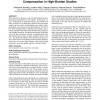Free Online Productivity Tools
i2Speak
i2Symbol
i2OCR
iTex2Img
iWeb2Print
iWeb2Shot
i2Type
iPdf2Split
iPdf2Merge
i2Bopomofo
i2Arabic
i2Style
i2Image
i2PDF
iLatex2Rtf
Sci2ools
108
Voted
HUC
2011
Springer
2011
Springer
Exploring micro-incentive strategies for participant compensation in high-burden studies
Micro-incentives represent a new but little-studied trend in participant compensation for user studies. In this paper, we use a combination of statistical analysis and models from labor economics to evaluate three canonical micro-payment schemes in the context of high-burden user studies, where participants wear sensors for extended durations. We look at how these strategies affect compliance, data quality, and retention, and show that when used carefully, micro-payments can be highly beneficial. We find that data quality is different across the micro-incentive schemes we experimented with, and therefore the incentive strategy should be chosen with care. We think that adaptive micro-payment based incentives can be used to successfully incentivize future studies at much lower cost to the study designer, while ensuring high compliance, good data quality, and lower retention issues. Author Keywords micro-payments, micro-incentives, user study. ACM Classification Keywords H.5.m Informa...
| Added | 23 Dec 2011 |
| Updated | 23 Dec 2011 |
| Type | Journal |
| Year | 2011 |
| Where | HUC |
| Authors | Mohamed Musthag, Andrew Raij, Deepak Ganesan, Santosh Kumar, Saul Shiffman |
Comments (0)

